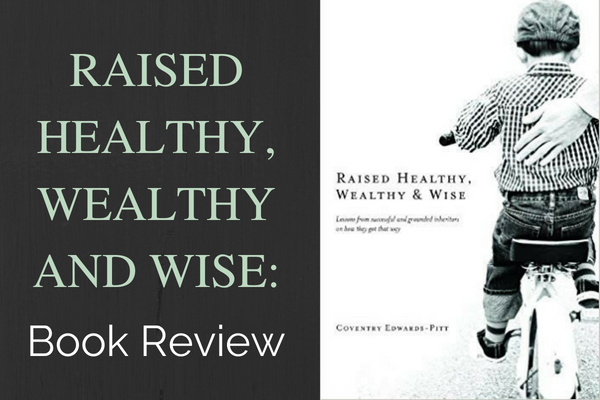 As parents, our goal is to raise children that will grow up to be happy, productive adults. This is a difficult task and we often are unsure if what we are doing is right for years to come. For families with high income or significant wealth, it can be even more challenging.
As parents, our goal is to raise children that will grow up to be happy, productive adults. This is a difficult task and we often are unsure if what we are doing is right for years to come. For families with high income or significant wealth, it can be even more challenging.
The easy thing is often not what will benefit your children the most in helping them become happy adults. Coventry Edward-Pitts, Chief Wealth Advisory Officer of a local wealth management firm, recently published a book, Raised Healthy, Wealthy & Wise, that brings together developmental information from respected psychologists and mixes it with interviews from what she calls “successful inheritors.”
These are individuals that grew up in families of wealth. She shares stories of how their parents enabled them to become happy, successful adults. It is a new perspective that provides great insight.
As a financial planner, I hear a lot about the need for financial literacy. I am a believer that more needs to be done to prepare our children to make good long-term financial decisions and for them to have a healthy relationship with money. However, I was disappointed to learn that studies show classes in financial literacy have very little long-term impact on good financial decision-making. This book illustrates that the values parents share and their actions have the biggest long-term impact on these individuals’ success in life and with money.
Four main threads that were identified in their interviews that led children to successfully launch into adult life in Raised Healthy, Wealthy & Wise:
- Have a demonstrated ability to earn their own money.
- Are motivated toward achieving personal goals – the most successful children showed a remarkable ability to set explicit goals for themselves and commit to working toward that goal. The individual’s sense of satisfaction and fulfillment was not tied to achieving the goal, but successfully driving toward it.
- Have a solid sense of self that is not wrapped up in issues related to wealth.
- Can overcome setbacks.
Children who were successful felt trusted, not judged by their parents. They felt the freedom to make their own choices, but they also were held accountable for those choices. Jane, an interviewee, told about running up a $1,000 credit card bill at the age of 16. Her parents owned a horse farm and made her work for $7/hr doing chores until she paid every penny back. They made her work 40 hours a week to show her what a real job was like. “How long it took me to pay them back taught me the value of a dollar,” she said. “Dad didn’t make me feel bad about it; there was just no other option.”
Edwards-Pitt shares a myth about how eagles build their nests when preparing for their young that has a powerful message. “First the father collects rocks and branches, often with thorns attached, and creates an underlayer. On top of this, he builds up a softer layer of grasses and feathers. When the baby eagles are born, they have a chance to mature in comfort, protected from predators. While living in the nest they are helpless, weak and passive. Then there comes a time when they begin to outgrow the confines of the nest but don’t yet know how to fly, let alone hunt down their own food.” At this point the mother begins to strip down the soft padding, so as the eagles teeter on the side of the nest afraid to launch for the first time, she is exposing them to the thorns and rocks and sharp branches. This is a way to encourage them to take flight.
Edward-Pitts quotes author and psychologist Madeline Levine in this book, “Parents help their children develop self-management skills by setting limits, modeling self-control, and being clear about tolerating frustration, delaying gratification and controlling impulses. The ability to self-manage effectively is a great predictor of both psychological adjustment and academic achievement,” says Levine.
Children need to learn through experience that they have the resilience and wherewithal to navigate life. From the examples in the book, expecting a lot out of their children taught them the value of doing something well. It also sent the message that their parents believed in them and thought they were capable of doing something more. Sometimes children need just one person to push them and believe in them. When they are successful at something they thought was beyond their abilities, they build confidence for the next time. If they fail, they build resilience and strive to keep going and to work harder.
It can be as simple as making your child perform at a dance recital. A friend recently shared a story about her daughter who had to present her thesis in college. She shared that the fact that her mother had made her overcome her stage fright as a young dancer is what gave her the confidence to overcome her fear of presenting her thesis. The lesson is, “It is never as bad as you think it will be.” Not helping kids out of a challenge is actually giving the best gift. It shows them that you believe that they can do it on their own, and it gives them the opportunity to build self-efficacy.
Being a parent is hard work. Edwards-Pitt simplifies how parents can be successful in giving children the freedom to separate while providing guidance by establishing guardrails, so they won’t crash and burn. She says this can be achieved by emphasizing four messages.
- There’s value in hard work.
- You may have to try a number of things before you find what you love.
- While you are finding what you really love, give every effort, no matter how menial, your best shot – you’ll learn from it.
- There are established and fixed parameters within we as parents will provide financial support.
In the wealth management industry, it is often advised to have family meetings and involve children and young adults with the family wealth. This book shows that is the wrong approach. Allowing our children to develop the skills we have summarized is much more important to their long-term success than involving them in the family money. Interviewers revealed the optimal approach that inheritors felt best-launched into their own lives when:
- Their parents were honest about the fact that they had money.
- The children viewed the money as their parents’ money that they worked hard for (and not as their own). Or, if the children inherited it, the kids understood that the money belonged to a tradition of family wealth that existed before their parents and would carry on beyond their lives.
- The kids knew the money would eventually come to them but not when and not how much.
- In the meantime, the kids were free to design their own lives and be independently productive, not overly influenced by the family wealth or by the anticipation of their inheritance.
I encourage you to read the book if this review was of interest to you. There are great insights and stories shared throughout it. The lesson is that actions speak louder than words. Model how you make values-based decisions, show gratitude, allow your children the joy of working (even if it may be hard with your busy schedule), trust them and hold them accountable, and show them how much you believe in them by encouraging them to do the things that are hard or holding them to a higher standard.





